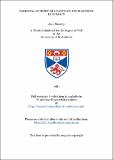Parental support of cognitive development in infancy
Abstract
This study examines the nature of parental involvement in the infants' play with objects (toys) and the effectiveness of the various forms of the parent's (mother's) intervention on the infant's cognitive growth. Assessment of the levels of the infants' cognitive competence were obtained through the administration of the Uzgiria and Hunt's "Infants Psychological Development Scales" which provided a formal measure of performance in various tasks that are related to specific areas of sensorimotor intelligence. Videotapes of 15-minute mother-infant play sessions in their homes, involving 6-, 9-, 12- and 15-month-old infants were quantified in terms of maternal and infant categories of behaviour that described variations in the involvement and complexity of the mothers' participation and the cognitive and social components of the infants' orientation to toys in an interpersonal context. Besides this cross-sectional method of data- collection, for each group, a quasi-longitudinal approach was adopted to trace the developmental changes of interpersonal play with objects across a period of three months. Analyses of maternal categories revealed quantitative and qualitative changes in maternal style of interaction as a function of the infant's age, as well as his level of cognitive abilities -relative to age peers. Mothers of 6-manth-olds were different from the mothers in the other groups in that they directed their infants' play into specific channels to an equal extent as their passive participation in the infants' spontaneous manipulative acts. All the other mothers adopted this latter 'enhancing' role to a greater extent than the former 'modifying' one. All mothers engaged in very little structured 'teaching' and very little 'assistance' of their infants. Analysis of the infants' data showed definite developmental changes in all forms of infants' orientation to objects in an interpersonal context. Cooperative play became noticeably more frequent and was more often infant-initiated after age 15 months. Rejection of play with the mother and lack of concentration on the play-task was characteristic of the 9-12 month-old infants. From the data, three conclusions were derived with respect to parental support and its effectiveness. Firstly, parents encourage autonomy and spontaneity in the infant since they 'enhance interaction' with the toys more than they 'modify' it. 'Modifying' is situation-specific in the sense that it increased when the infants' spontaneous manipulations were relatively infrequent, or when they were characterised by a low-level of cognitive complexity, or when the infant was less advanced than his peers on the sensorimotor intelligence scales. However, with age increases the mothers increased their demands from the infants by initiating more tasks for them to reciprocate. The second conclusion is that when the mothers 'modify' interaction they time their activities in accordance with the infants' ongoing behaviour thereby encouraging the infants' attention to the mother and increasing the likelihood of achieving the goal set by her. The third conclusion relates to the effectiveness of parental intervention. Infants whose age was above 9 months seemed to be more dependent on, and more affected by, their mothers' directive intervention. These findings are discussed in terms of the implication for child- rearing practices and pre-school education.
Type
Thesis, PhD Doctor of Philosophy
Collections
Items in the St Andrews Research Repository are protected by copyright, with all rights reserved, unless otherwise indicated.

